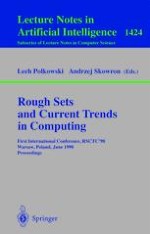1998 | Buch
Rough Sets and Current Trends in Computing
First International Conference, RSCTC’98 Warsaw, Poland, June 22–26, 1998 Proceedings
herausgegeben von: Lech Polkowski, Andrzej Skowron
Verlag: Springer Berlin Heidelberg
Buchreihe : Lecture Notes in Computer Science
Enthalten in: Professional Book Archive
